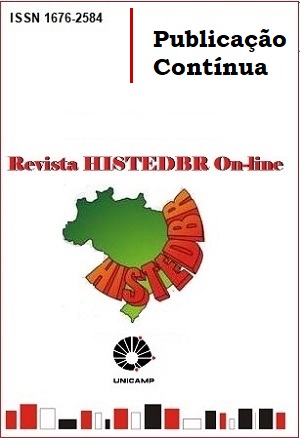Abstract
This article aims to understand Paulo Freire's vision of systematized knowledge and its socialization in school, in the work Pedagogy of autonomy: knowledge necessary for educational practice. (FREIRE, 2016a). The leading thread of the analysis will be the ontology, since it is from the understanding of the birth of man as a social being and at the service of the process of humanization that he idealizes, that Freire explicitly explains his view of knowledge and develops his pedagogical theory, (SAVIANI, 2008). In this context, it is important to emphasize the importance of education in the modern humanist philosophy of education. In this prism, taking as reference the historical-critical pedagogy - systematized from works by Saviani (2013) Duarte, (2016) and Martins (2013), among other theorists will fit in this article a comparison between the sense of knowledge for pedagogy of autonomy and for historical-critical pedagogy. Our attempt here is to capture the essence of Freire's (2016a) thinking about knowledge to understand to what extent his theory may contribute to create an irreversible, superior and revolutionary condition of humanization.
References
DUARTE, N. Os conteúdos escolares e a ressurreição dos mortos: contribuição à teoria histórico-crítica do currículo. Campinas: Autores Associados, 2016.
DUARTE, N. Vigotski e o “aprender a aprender”: crítica às apropriações neoliberais e pós-modernas da teoria vigotskiana. Campinas: Autores Associados, 2011.
ENGELS, F. Sobre o papel do trabalho na transformação do macaco em homem. In: ANTUNES, R. (org.). A dialética do trabalho. São Paulo: Expressão Popular, 2013. v. 1.
FREIRE, P. Pedagogia da autonomia: saberes necessários à prática educativa. 54. ed. Rio de Janeiro: Paz e Terra, 2016a.
FREIRE, P. Pedagogia do oprimido. 62. ed. Rio de Janeiro: Paz e Terra, 2016b.
FRIGOTTO, G. A produtividade da escola improdutiva: um (re)exame das relações entre educação e estrutura econômico-social capitalista. 9. ed. São Paulo: Cortez, 2010.
GRAMSCI, A. Os intelectuais e a organização da cultura. Tradução de Carlos Nelson Coutinho. 4. ed. Rio de Janeiro, RJ: Civilização Brasileira, 1982.
KOPNIN, P. V. A dialética como lógica e teoria do conhecimento. Rio de Janeiro: Civilização Brasileira, 1978.
KOSIK, K. Dialética do concreto. 2. ed. Rio de Janeiro: Paz e Terra, 1976.
LEFEBVRE, H. Lógica formal/lógica dialética. Rio de Janeiro: Civilização Brasileira, 1975.
MARTINS, L. M. O desenvolvimento do psiquismo e a educação escolar: contribuições à luz da psicologia histórico-cultural e da pedagogia histórico-crítica. 2. ed. Campinas, SP: Autores Associados, 2013.
MARX, K.; ENGELS, F. A ideologia alemã: crítica da mais recente filosofia alemã em seus representantes Feuerbach, B. Bauer e Stirner, e do socialismo alemão em seus diferentes profetas 1845- 1846. São Paulo: Boitempo, 2007.
MARX, K. Contribuição à crítica da economia política. 2. ed. São Paulo: Expressão Popular, 2008.
MARX, K. Manuscritos econômico-filosóficos. São Paulo: Boitempo, 2010. (Coleção Marx-Engels).
MARX, K. O capital: crítica da economia política: 34. ed. Rio de Janeiro: Civilização Brasileira, 2016. livro 1.
SAVIANI, D. Escola e democracia. 40. ed. Campinas, SP: Autores Associados, 2008.
SAVIANI, D. Pedagogia histórico-crítica: primeiras aproximações. 1. ed. Campinas, SP: Autores Associados, 2013.
A Revista HISTEDBR On-line utiliza a licença do Creative Commons (CC), preservando assim, a integridade dos artigos em ambiente de acesso aberto.


